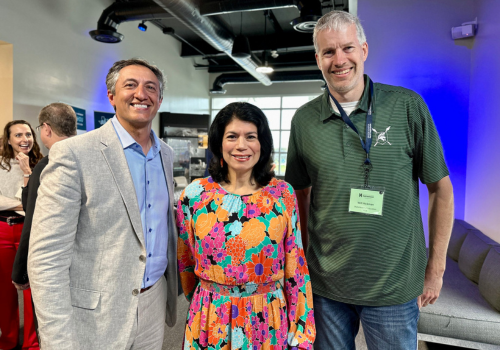Legislative Session Update: Week 17
Published May 03, 2019 by Taylor Landin
During the 86th Legislative Session, the Partnership will provide a weekly update on our top executive priorities and other newsworthy items from Austin.
As we kicked off the final month of the 86th Legislative Session this week, three issues took significant steps forward. The House voted its property tax bill off the floor, the Senate Education Committee voted House Bill 3, the school finance reform legislation, out of committee, and Senate bills related to flood resilience were heard in the House Natural Resources Committee.
PARTNERSHIP EXECUTIVE PRIORITIES
FLOOD RESILIENCE
On Tuesday, the House Natural Resources Committee heard the committee substitute for Senate Bill 7 by Senator Brandon Creighton (R-Conroe), which passed the Senate on April 20. As passed by the Senate, SB 7 would create the Texas Infrastructure Resiliency Fund, which would contain accounts to provide for FEMA local matching funds for Hurricane Harvey recovery projects, local matching funds for United States Army Corps of Engineers projects and a statewide program for future flood mitigation projects. The committee substitute for SB 7 focuses solely on future flood mitigation by creating a State Flood Plan Implementation Account that would be used to fund projects contained in a state flood plan. It is important to note that while SB 7 creates an account by which flood-related projects would be funded, appropriations for key programs related to flooding and resiliency are contained within Senate Bill 500, the supplemental appropriations bill, by Senate Finance Chairwoman Jane Nelson (R-Flower Mound), which includes more than $600 million in matching funds for Hurricane Harvey recovery projects.
Taylor Landin, the Partnership's SVP of Public Policy, testified before the committee alongside the City of Houston and Harris County Flood Control District in support of the committee substitute for SB 7. Landin emphasized the business community’s strong support for making Texas more resilient and encouraged key leaders to continue to focus on this issue until legislation is sent to Governor Greg Abbott.
SCHOOL FINANCE REFORM
The Senate Public Education Committee, led by Chairman Larry Taylor (R-Friendswood), met this week to consider a second Senate committee substitute to the school finance reform legislation, House Bill 3 by House Public Education Committee Chairman Dan Huberty (R-Kingwood). The new substitute for the bill contained perfecting language with technical changes to the original substitute introduced last week.
Before voting on the bill, the committee discussed four primary issues that were reflected in the committee substitute:
- The inclusion of a $5,000 across-the-board pay raise for all full-time teachers and librarians, limiting the amount of new funding that is available for local school districts to use at their discretion.
- A move from using prior year property tax values to calculate the state's share of public education funding to using current year property tax values. Witnesses against this proposal argue that using prior year property values allows the state Comptroller’s Office to properly certify the property values, giving school districts more predictability when developing their budgets.
- Major property tax provisions include: Local school district property tax compression of 15 cents by year three, an increase of the Homestead Exemption to $40,000 and a 2.5 percent revenue rollback rate for school districts.
- An increase of the state sales tax by one percent in exchange for reducing local school district property taxes.
Following debate, the committee passed the bill with a vote of 8-0. Three Republican members of the committee, citing concerns that they did not have sufficient time to read the entire substitute prior to voting on the legislation, decided not to cast a vote for or against the bill. HB 3 is currently scheduled to be considered on the floor of the Senate this Monday.
WEEK IN REVIEW
University of Houston College of Medicine
Governor Greg Abbott signed HB 826 by Rep. John Zerwas (R-Richmond) into law this week, officially establishing the University of Houston College of Medicine. The new UH Medical School will focus on training students to be primary care physicians with the goal of filling the shortage of physicians practicing in underserved urban and rural communities. Texas ranks 47th among U.S. states in primary care physicians to population ratio, and graduates of existing medical schools are practicing in primary care at a rate of less than 20 percent. The first class of 30 students is expected to begin in the fall of 2020.
Property Tax Reform
The House debated property tax reform for six hours on Tuesday. As discussed in last week's Legislative Update, the House language mirrors much of the Senate’s priorities, with a 3.5 percent property tax revenue rollback rate for larger cities and counties, as well as significant transparency and procedural reforms to the appraisal setting and appraisal review process. One amendment made to the bill after committee hearings allows smaller taxing entities to exceed the 3.5 percent trigger for the purchase of one-time purchases of up to $500,000.
House leadership, including bill sponsor and Ways & Means Committee Chairman Dustin Burrows (R-Lubbock), stated multiple times that property tax reform is inextricably linked to school finance funding. The bill passed the House by more than a two-thirds vote. Senate Bill 2 will now go to a conference committee composed of members from the House and Senate to work out the remaining differences and align the language with the ongoing school finance reform negotiations.
Municipal Issues
House State Affairs Committee heard four bills by Senator Brandon Creighton (R-Conroe) designed to overturn various local ordinances governing employer-employee relationships, such as paid sick leave and predictive scheduling. Numerous business organizations, including the Partnership, have asked that language protecting local non-discrimination ordinances be added to these bills.
Senate Bill 2486 was voted out of committee with the non-discrimination ordinance language restored. Now the focus will turn to the Senate and how the upper chamber responds to the amended version of SB 2486.
Stay up-to-date with our Policy Team throughout the 86th Legislative Session by opting-in to this weekly update or follow the team on Twitter @GHP_Policy
 The Houston Report
The Houston Report




















